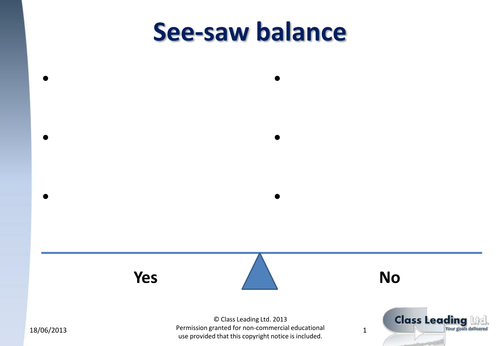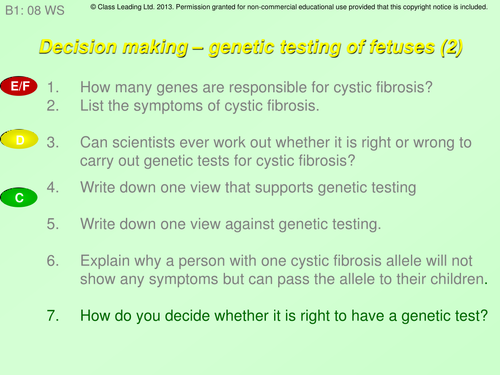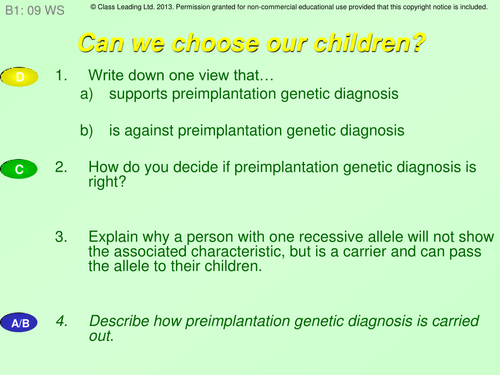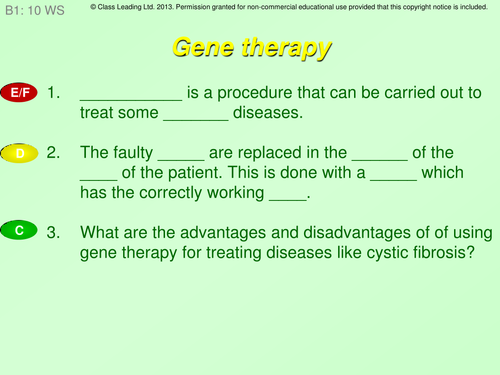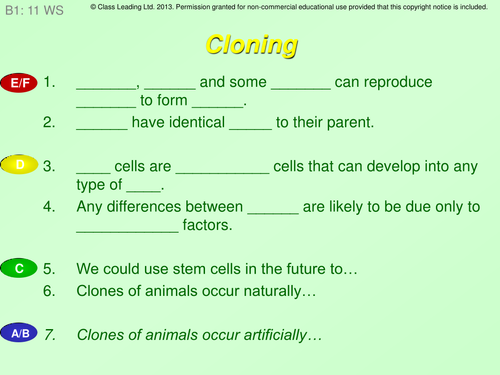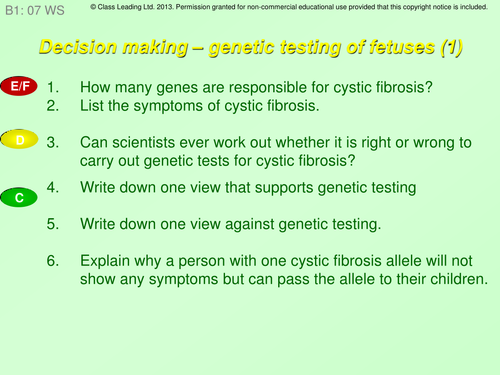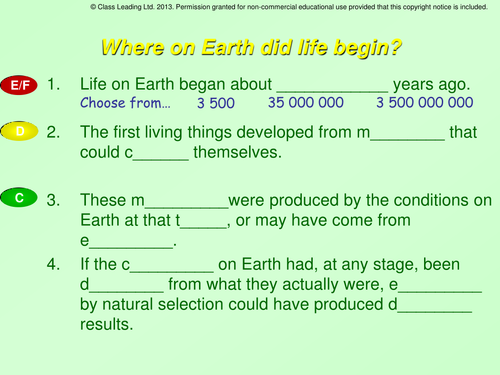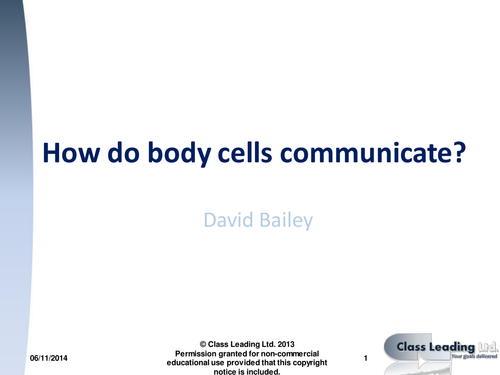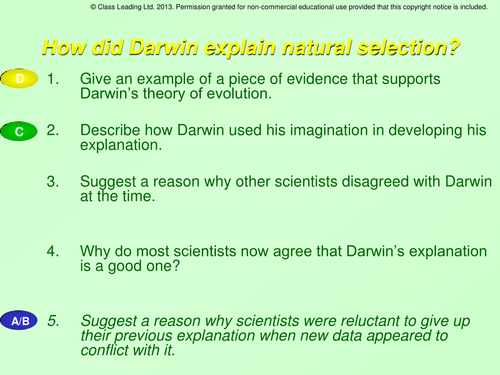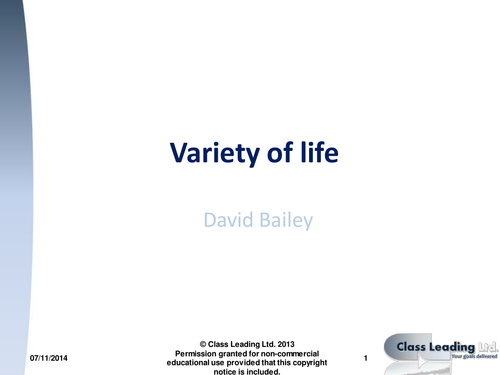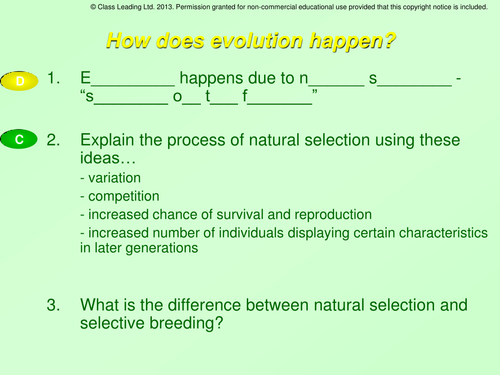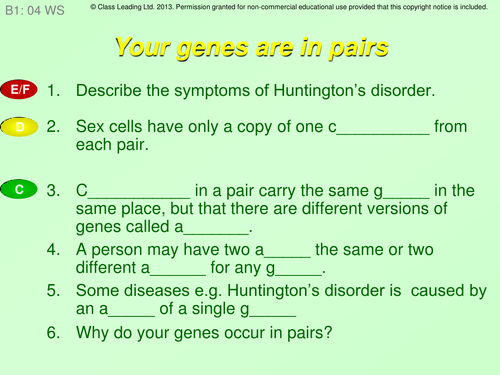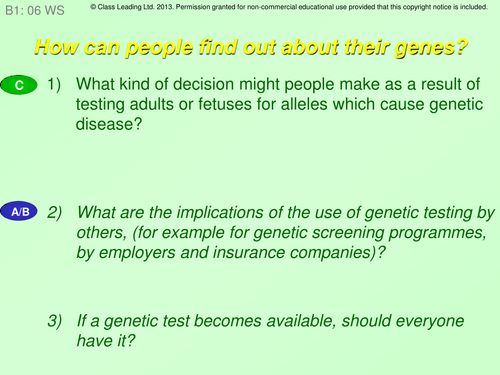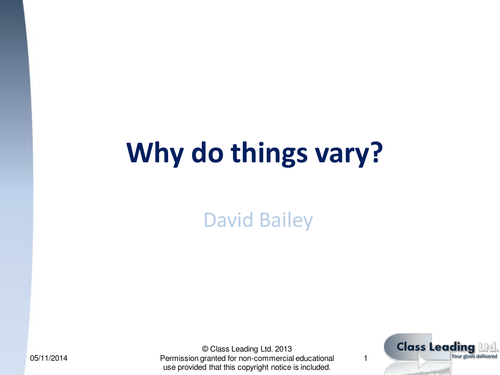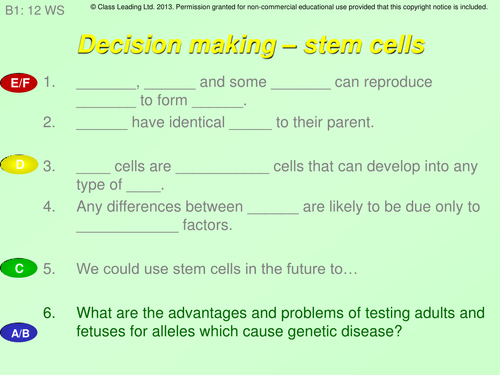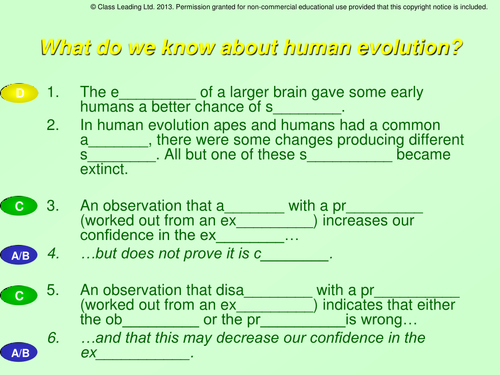314Uploads
262k+Views
194k+Downloads
Biology

Weighing up arguments - See saw writing frame
This resource is a collection of 6 slightly different see-saw balances that can be used with learners to help them develop the skills to weigh up an argument. The idea is that students will list reasons on both side of an argument (e.g. Should we have Nuclear Power?). They then use this to help make a decision. The scoring column on some sheets allows learners to score each argument out of a maximum of say 3. Add the scores on each side to see which has the stronger argument. This also includes phrases to support a more detailed conclusion. This was inspired by 21st Century Science.

'Where do I stand?' cards - perceptions activity
This activity allows students to indicate their perceptions on a particular question. The question might be a debate e.g. ‘Should we build more nuclear power stations?’, ‘Is cloning a good idea?’ or ‘Should social media be banned?’.
To use the cards, print and laminate the cards. Lay the cards out along a line and ask the students to stand near the card that represents how strongly they agree (not on the card due to risk of slipping). Then ask them to justify their reasoning.
This works really well when carried out before and after a debate.
Designed for use in science, these also have use in other subjects such as Citizenship, PSHE and RE. Inspired by an activity at the NCT.

What killed the Mammoths (editable)
This is a collection of resources that would work well as a lesson. A lesson outline is provided showing how the resources might be used together. There is an email designed to set the scene and for use as as a ‘hook’. There are also sheets for learners to summarise their learning (tweet).
You may want to supplement the resources with pictures of a woolly mammoth (link only due to copyright restrctions) and video ‘footage’ e.g from Ice Age movie.
This was designed as lesson for a KS3 nurture group although would be suitable for KS2 or other KS3 groups with adaptation.
Please note that this is an editable version. A free, non-editable version is also available.

Food chains & energy transfer (updated)
This is an editable worksheet based activity that includes some higher order thinking to explore the ideas around energy transfer in simple food chains. Two versions are included, one with revised GCSE (1-9) grades, the other without. (please note that grade indications are only approximate). Why not try getting learners to choose a selection of questions to answer (e.g. do Q1-4 or Q3-8) An answer sheet is included.
This resource was originally designed for OCR 21st Century Science unit B3, but still applies across a range of exam specifications.
Keywords: energy, transfer, food chain, efficiency

Genetics decision making (2) - graded questions
This activity contains a powerpoint with graded questions & answers and matching pupil activity sheets, designed to be used at the end of a lesson and/or the start of the next lesson to review previous learning. The questions are based on the previous OCR 21st Century Science Specification unit B1, although could be used with other exam boards.
Clicking through the show reveals answers one a time. These reduce to A5 easily, the ideal size for most pupils. Please note grades are approximate.

Can we choose our children - graded questions
This activity contains a powerpoint with graded questions & answers and matching pupil activity sheets, designed to be used at the end of a lesson and/or the start of the next lesson to review previous learning. The questions are based on the previous OCR 21st Century Science Specification unit B1, although could be used with other exam boards.
Clicking through the show reveals answers one a time. These reduce to A5 easily, the ideal size for most pupils. Please note grades are approximate.

Gene therapy - graded questions
This activity contains a powerpoint with graded questions & answers and matching pupil activity sheets, designed to be used at the end of a lesson and/or the start of the next lesson to review previous learning. The questions are based on the previous OCR 21st Century Science Specification unit B1, although could be used with other exam boards.
Clicking through the show reveals answers one a time. These reduce to A5 easily, the ideal size for most pupils. Please note grades are approximate.

Cloning - graded questions
This activity contains a powerpoint with graded questions & answers and matching pupil activity sheets, designed to be used at the end of a lesson and/or the start of the next lesson to review previous learning. The questions are based on the previous OCR 21st Century Science Specification unit B1, although could be used with other exam boards.
Clicking through the show reveals answers one a time. These reduce to A5 easily, the ideal size for most pupils. Please note grades are approximate.

Genetics decision making (1) - graded questions
This activity contains a powerpoint with graded questions & answers and matching pupil activity sheets, designed to be used at the end of a lesson and/or the start of the next lesson to review previous learning. The questions are based on the previous OCR 21st Century Science Specification unit B1, although could be used with other exam boards.
Clicking through the show reveals answers one a time. These reduce to A5 easily, the ideal size for most pupils. Please note grades are approximate.

Where did life begin - graded questions
This activity contains a powerpoint with graded questions & answers and matching pupil activity sheets, designed to be used at the end of a lesson and/or the start of the next lesson to review previous learning. The questions are based on the previous OCR 21st Century Science Specification unit B3, although could be used with other exam boards.
Clicking through the show reveals answers one a time. These reduce to A5 easily, the ideal size for most pupils. Please note grades are approximate.

Cell communication - graded questions
This activity contains a powerpoint with graded questions & answers and matching pupil activity sheets, designed to be used at the end of a lesson and/or the start of the next lesson to review previous learning. The questions are based on the previous OCR 21st Century Science Specification unit B3, although could be used with other exam boards.
Clicking through the show reveals answers one a time. These reduce to A5 easily, the ideal size for most pupils. Please note grades are approximate.

Darwin natural selection - graded questions
This activity contains a powerpoint with graded questions & answers and matching pupil activity sheets, designed to be used at the end of a lesson and/or the start of the next lesson to review previous learning. The questions are based on the previous OCR 21st Century Science Specification unit B3, although could be used with other exam boards.
Clicking through the show reveals answers one a time. These reduce to A5 easily, the ideal size for most pupils. Please note grades are approximate.

Variety of life - graded questions
This activity contains a powerpoint with graded questions & answers and matching pupil activity sheets, designed to be used at the end of a lesson and/or the start of the next lesson to review previous learning. The questions are based on the previous OCR 21st Century Science Specification unit B3, although could be used with other exam boards.
Clicking through the show reveals answers one a time. These reduce to A5 easily, the ideal size for most pupils. Please note grades are approximate.

How does evolution happen - graded questions
This activity contains a powerpoint with graded questions & answers and matching pupil activity sheets, designed to be used at the end of a lesson and/or the start of the next lesson to review previous learning. The questions are based on the previous OCR 21st Century Science Specification unit B3, although could be used with other exam boards.
Clicking through the show reveals answers one a time. These reduce to A5 easily, the ideal size for most pupils. Please note grades are approximate.

Your genes are in pairs
This activity contains a powerpoint with graded questions & answers and matching pupil activity sheets, designed to be used at the end of a lesson and/or the start of the next lesson to review previous learning. The questions are based on the previous OCR 21st Century Science Specification unit B1, although could be used with other exam boards.
Clicking through the show reveals answers one a time. These reduce to A5 easily, the ideal size for most pupils. Please note grades are approximate.

Finding out about genes - graded questions
This activity contains a powerpoint with graded questions & answers and matching pupil activity sheets, designed to be used at the end of a lesson and/or the start of the next lesson to review previous learning. The questions are based on the previous OCR 21st Century Science Specification unit B1, although could be used with other exam boards.
Clicking through the show reveals answers one a time. These reduce to A5 easily, the ideal size for most pupils. Please note grades are approximate.

Why things vary
This activity contains a powerpoint with graded questions & answers and matching pupil activity sheets, designed to be used at the end of a lesson and/or the start of the next lesson to review previous learning. The questions are based on the previous OCR 21st Century Science Specification unit B1, although could be used with other exam boards.
Clicking through the show reveals answers one a time. These reduce to A5 easily, the ideal size for most pupils. Please note grades are approximate.

Stem cells - graded questions
This activity contains a powerpoint with graded questions & answers and matching pupil activity sheets, designed to be used at the end of a lesson and/or the start of the next lesson to review previous learning. The questions are based on the previous OCR 21st Century Science Specification unit B1, although could be used with other exam boards.
Clicking through the show reveals answers one a time. These reduce to A5 easily, the ideal size for most pupils. Please note grades are approximate.

What makes you the way you are - questions
This activity contains a powerpoint with graded questions & answers and matching pupil activity sheets, designed to be used at the end of a lesson and/or the start of the next lesson to review previous learning. The questions are based on the previous OCR 21st Century Science Specification unit B1, although could be used with other exam boards.
Clicking through the show reveals answers one a time. These reduce to A5 easily, the ideal size for most pupils. Please note grades are approximate.

Human evolution - graded questions
This activity contains a powerpoint with graded questions & answers and matching pupil activity sheets, designed to be used at the end of a lesson and/or the start of the next lesson to review previous learning. The questions are based on the previous OCR 21st Century Science Specification unit B3, although could be used with other exam boards.
Clicking through the show reveals answers one a time. These reduce to A5 easily, the ideal size for most pupils. Please note grades are approximate.

